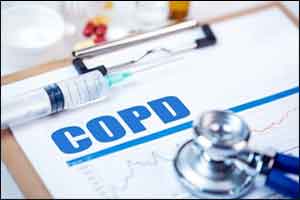- Home
- Editorial
- News
- Practice Guidelines
- Anesthesiology Guidelines
- Cancer Guidelines
- Cardiac Sciences Guidelines
- Critical Care Guidelines
- Dentistry Guidelines
- Dermatology Guidelines
- Diabetes and Endo Guidelines
- Diagnostics Guidelines
- ENT Guidelines
- Featured Practice Guidelines
- Gastroenterology Guidelines
- Geriatrics Guidelines
- Medicine Guidelines
- Nephrology Guidelines
- Neurosciences Guidelines
- Obs and Gynae Guidelines
- Ophthalmology Guidelines
- Orthopaedics Guidelines
- Paediatrics Guidelines
- Psychiatry Guidelines
- Pulmonology Guidelines
- Radiology Guidelines
- Surgery Guidelines
- Urology Guidelines
Spirometry with bronchodilator testing can prevent COPD overdiagnosis: CHEST

USA: Routine use of spirometry with bronchodilator (BD) testing not only prevents the overdiagnosis of chronic obstructive pulmonary disease (COPD) but also helps in the identification of subjects with potential asthma-COPD overlap syndrome (ACOS) and asthma.
These are the results of a recent study presented at the CHEST 2019 Annual Meeting in New Orleans and subsequently published in the CHEST journal.
Spirometry with BD testing has a limited presence in clinical practice for the diagnosis of COPD despite the recommendation to use the post BD ratio of forced expiratory volume in the first second (FEV1) over forced vital capacity (FVC). Srinadh Annangi, the University of Kentucky College of Medicine, and colleagues aimed to determine the role of BD testing in avoiding COPD overdiagnosis and identifying subjects with a possible alternate diagnosis like asthma and ACOS.
The researchers used NHANES data analyzed from 2007-2013. Subjects ≥40 years or older with spirometry studies meeting the American Thoracic Society (ATS) quality standards were included. Blood eosinophil counts and FEV1 change were used to define blood eosinophilia and bronchodilator reversibility.
The NHANES-listed question of “Has a doctor or health care professional ever told you that you have asthma?” was used to define asthma history. ACOS risk was identified by 2 of the following: post-bronchodilator FEV1/FVC < 0.7, FEV1 change of ≥400 ml, or asthma history—along with any 1 minor criteria listed.
The observed patient population included 8002 subjects ≥40 years old who had completed pre-bronchodilator spirometry testing.
Key findings include:
- 625 met ATS spirometry quality standards and had an initial FEV1/FVC < 0.7. Of these patients, 381 (61%) had post-bronchodilator FEV1/FVC < 0.7—confirming irreversible airway obstruction.
- Of the 381 patients, 12 (3.1%) had asthma history and bronchodilator reversibility; 16 (4.2%) had asthma history and blood eosinophilia; 2 (0.7%) had FEV1 change of ≥400 ml and blood eosinophilia.
- Investigators noted ACOS was more likely than lone COPD in these patients.
- Of the remaining 244 patients, 24 (9.8%) had bronchodilator reversibility—10 of which having eosinophilia, making asthma more likely.
- Another 18 of the patients with bronchodilator reversibility and 6 of the 10 patients with reversibility and eosinophilia had no prior asthma history. These patients would likely be diagnosed incorrectly as having COPD if pre-bronchodilator FEV1/FVC was noted considered.
"COPD overdiagnosis could occur in 39% of subjects, and called for further evaluation for potential asthma in 9.8% of the subjects observed in their study," concluded the authors. "Another 8% of patients diagnosed with COPD likely have ACOS as well, based on post-bronchodilator spirometry values and recommended criteria."
More Information: "Role of Bronchodilator Testing in Identifying COPD, Asthma, and Asthma-COPD Overlap Syndrome: NHANES III Analysis" published in the CHEST journal.
DOI: https://doi.org/10.1016/j.chest.2019.08.126
Journal Information: CHEST

Disclaimer: This site is primarily intended for healthcare professionals. Any content/information on this website does not replace the advice of medical and/or health professionals and should not be construed as medical/diagnostic advice/endorsement or prescription. Use of this site is subject to our terms of use, privacy policy, advertisement policy. © 2020 Minerva Medical Treatment Pvt Ltd